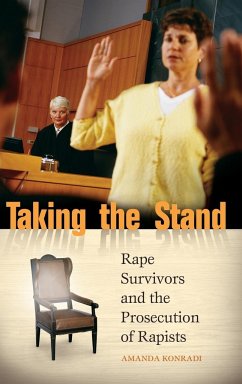Rape is one of the most under-reported crimes in the U.S., and yet it is one of the most vicious, devastating, and violent of all crimes. But getting justice for victims has not always been easy. Often the victim is criminalized, demonized, sexualized, or otherwise attacked for her own part in the rape. But over the years, laws have changed and prosecuting rapists has become more common. Taking the Stand describes the criminal prosecution of rapists from the perspective of the women who survived their violence and explores if, when, and how the criminal justice process can work for them. Walking through the various responses rape victims have had to the criminal justice process, Konradi's vivid analysis provides new information to help raped women decide whether and how they should participate in prosecution, to help friends and family assist them, and to improve criminal justice practice for crime victims generally. Taking the Stand follows 47 rape survivors of varied ages and ethnicities, from the terror and trauma of rape through reporting to law enforcement, police investigation and indictment, hearings for probable cause and trials, plea bargaining, and sentencing. It focuses on women's experiences throughout the process and demonstrates how every experience is different. The problems that rape survivors face in the criminal justice process are not simply the result of the adversarial nature of court, defense tactics, or their own emotional reactions to violent sexual domination. Problems emerge from: (1) the social networks in which survivors are situated, (2) their variable access to emotional and financial resources, (3) their lack of knowledge about the formal and informal practices of courtrooms, (4) their lack of structural power in the criminal justice process, and (5) standard procedures employed by prosecutors and police. By recognizing individual differences in rape survivors, and their rape experiences, criminal justice personnel can better serve victims, and by understanding the layers of criminal investigation and prosecution, survivors and their families can play a more active role on their own terms in an effort to bring about justice. A rape survivor herself, Konradi exposes in the raw language of the victims the very sensitive nature of the topic and the personal obstacles survivors face. By addressing each stage of the criminal justice process, she makes it easier for those who seek justice to make decisions and choose behaviors that will positively affect their outcomes and their personal experiences with the system.
Hinweis: Dieser Artikel kann nur an eine deutsche Lieferadresse ausgeliefert werden.
Hinweis: Dieser Artikel kann nur an eine deutsche Lieferadresse ausgeliefert werden.









